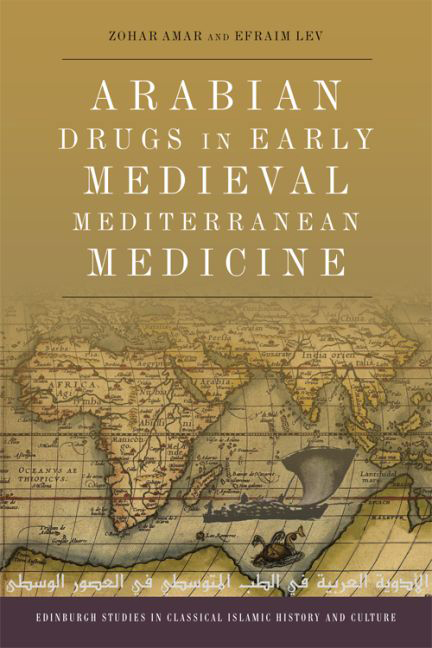Book contents
- Frontmatter
- Contents
- List of Plates
- List of Tables
- Preface
- Map: The Origin of the Main Medieval Arabian Drugs
- 1 Introduction
- 2 Agricultural and Pharmaceutical Innovations: Milestones in Research and Case Studies
- 3 ‘Arabian’ Substances
- 4 Discussion and Conclusions
- Bibliography
- Index of English Names
- Index of Arabic Names
- Index of Scientific Names
4 - Discussion and Conclusions
Published online by Cambridge University Press: 27 April 2017
- Frontmatter
- Contents
- List of Plates
- List of Tables
- Preface
- Map: The Origin of the Main Medieval Arabian Drugs
- 1 Introduction
- 2 Agricultural and Pharmaceutical Innovations: Milestones in Research and Case Studies
- 3 ‘Arabian’ Substances
- 4 Discussion and Conclusions
- Bibliography
- Index of English Names
- Index of Arabic Names
- Index of Scientific Names
Summary
Dols rightly remarks in his article that despite the great contribution of the Indians to the inventory of medicinal substances in the early Islamic period, their documentation is very vague: ‘Consequently, although Indian medicine made a substantial contribution to early Islamic medicine, these men remain shadowy figures.’ Indeed, even though remnants of the Indian medical legacy can be found in the medical books of al-ʺabarī, al-Rāzī and others, it is the Greek medical tradition that predominates in their writings. The two authors named represent physicians hailing, geographically, from the margins of influence of the Indian legacy. The Indian healing tradition was deferred to the Greek tradition at an early stage during the rule of the Abbasids in Baghdad. One of the reasons for this, as mentioned previously, was the influence of many of the translators of the Bayt al-Oikma, who were typical representatives and propagators of the Classical school. After all, this was an ancient heritage in the Middle Eastern sphere and was well-known for its culture, languages, customs and patterns of thought.
The Christians had already ‘rendered’ Galenic medicine, in which, in their opinion, pagan traces remained. They translated it selectively and in such a way that Judaism and Islam could adopt it without demur. True, the Arabs appreciated the Indian legacy, but it was too foreign in its spiritual, physical and philosophical culture. Al-Bīrūnī, a physician whose writings embody a great deal of Indian knowledge and who was well acquainted with Indian medicinal substances unknown to the Greeks, describes the case quite well. Notwithstanding the contribution of the Indian medical legacy, in the end it seems as if al-Bīrūnī believed that precedence should be given to the Greeks, not only because they were more advanced and superior in their medical knowledge and practice, but also because their legacy better suited the people of the Near East and their mentality:
Every nation has specialised in one art or technology. The Greeks, before the Christians, surpassed the latter in the discussion of this art and took it to the pinnacle of perfection. Were Dioscorides living amongst us, he would have searched our mountains and forests for herbs. All our wild plants would have become drugs and used as cures.
- Type
- Chapter
- Information
- Arabian Drugs in Early Medieval Mediterranean Medicine , pp. 260 - 268Publisher: Edinburgh University PressPrint publication year: 2017



